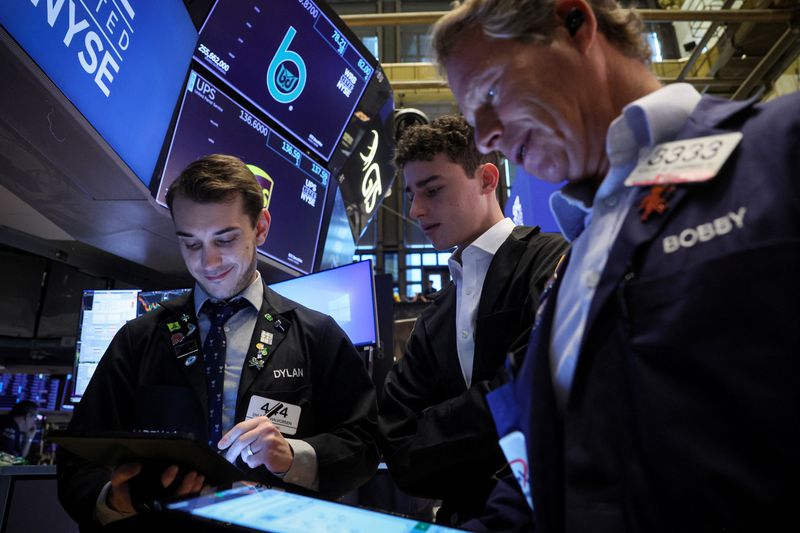By David French
(Reuters) -The S&P 500 and Nasdaq Composite ended a fickle session weaker on Thursday, failing to regain ground lost in the previous day's tech-triggered sell-off as investors grappled with the likely direction of megacaps.
The Dow Jones Industrial Average hung onto early gains to close higher on stronger-than-expected U.S. gross domestic product data.
Small-cap stocks also rose as investors sought out value away from the megacaps, with the Russell 2000 rising 1.3% to partially recoup some of Wednesday's losses.
Megacap stocks recovered from a shaky start to trade higher at mid-afternoon but many slipped later, with Meta (NASDAQ:META) Platforms Microsoft (NASDAQ:MSFT) and Nvidia (NASDAQ:NVDA) ending between 1.7% and 2.4% down.
Alphabet (NASDAQ:GOOGL)'s shares fell for a second straight day, dipping 3.1% to its lowest close since May 6, but Tesla (NASDAQ:TSLA) rose. Lackluster earnings from the Google parent and the electric vehicle maker had pummeled the so-called Magnificent Seven group of tech stocks on Wednesday, prompting the Nasdaq and S&P 500 to log their worst day since 2022.
The Cboe Volatility Index, known as Wall Street's fear gauge, extended its recent gains to close at 18.46, a fresh 14-week high.
"I think the market is kind of lurching," said Yung-Yu Ma, chief investment officer at BMO (TSX:BMO) Wealth Management. "The concern had been building and yesterday was a bit of a crescendo of that concern, but some of that has been alleviated today."
While investors are still trying to grapple with Wednesday's disappointing earnings reports, and political and economic uncertainty, Ma said ultimately recent data shows a resilient U.S. economy.
Thursday's GDP report showed the U.S. economy expanded 2.8% in the second quarter versus an estimate of 2%. Inflation subsided, leaving expectations of a September Federal Reserve interest rate cut intact.
All eyes are now on Friday's personal consumption expenditures price data to confirm bets of an early start to Fed rate cuts.
While heavyweight stocks have powered the market to all-time highs this year, Wednesday's sell-off reinforced fears that these stocks might be over-stretched and are in for more turbulence.
This concern has driven value investors, speeding up their rotation into smaller-cap stocks and other sectors outside megacap technology.
The S&P Small Cap 600 rose 1.4% on Thursday.
The S&P 500 lost 27.91 points, or 0.51%, at 5,399.22 points, while the Nasdaq Composite fell 160.69 points, or 0.93%, to 17,181.72. The Dow Jones Industrial Average rose 81.20 points, or 0.20%, to 39,935.07.
Among earnings-driven moves, IBM (NYSE:IBM) shares jumped 4.3%, also boosting the blue-chip Dow, after the tech company beat estimates for second-quarter revenue and raised the annual growth forecast for its software business.
American Airlines (NASDAQ:AAL) rose 4.2% after cutting its annual profit forecast. Southwest Airlines (NYSE:LUV) climbed 5.5% after saying it would implement changes including ending open seating and offering seats with extra legroom.
Advances by airlines and logistics firms, with Old Dominion up 5.7% and J B Hunt rising 4.3%, helped the Dow Jones Transportation Average gain 1.3%.

Ford slumped 18.4% after the automaker's second-quarter adjusted profit missed estimates by a wide margin. Edwards Lifesciences (NYSE:EW) tumbled 31.3% after it missed second-quarter revenue estimates.
Volume on U.S. exchanges was 13.23 billion shares, compared with the 11.60 billion average for the full session over the last 20 trading days.